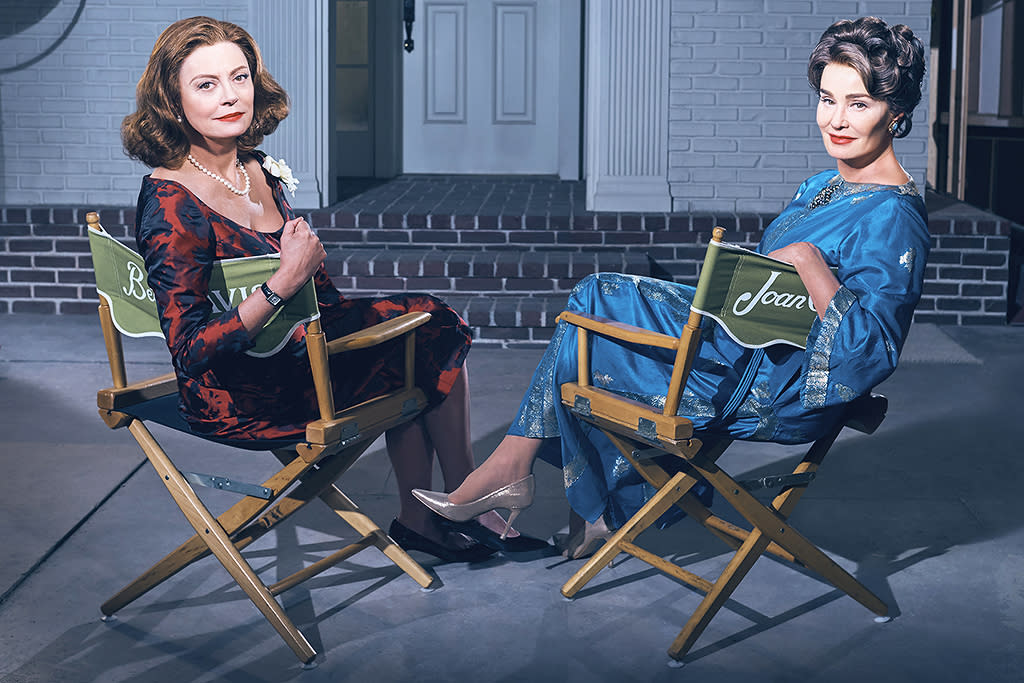‘Feud: Bette and Joan’: Catfights and Sexism

Fun and clever, with serious things to say about sexism and ageism, Feud: Bette and Joan chronicles the corrosive relationship between Bette Davis and Joan Crawford during and after the making of the 1962 film Whatever Happened to Baby Jane? If your heart does not go pitty-pat upon reading that description, you may find this eight-episode series a tad too backloaded with inside-old-Hollywood campiness. The show is very well-constructed, while also feeling like a cult item in the making.
Susan Sarandon and Jessica Lange are excellent as Davis and Crawford, respectively, in Feud, the latest FX anthology series from writer-producer-director Ryan Murphy (American Horror Story, American Crime Story). If you’re not familiar with the old movie on which this Feud is founded, Baby Jane was conceived as a garish B-movie designed to trade on the fading wattage of Davis and Crawford — audiences got off on the spectacle of seeing these one-upon-a-time-glamorous stars lower themselves into the muck of a melodrama about sisters squabbling over their own faded youth and dashed dreams.
By the 1960s, Davis and Crawford were at least two decades past their most esteemed work, and Feud has a lot of grim fun showing us how callous the movie studios (primarily in the person of Jack Warner, played cuttingly by Stanley Tucci) and the press (in the person of powerful gossip columnist Hedda Hopper, played by this series’ Most Valuable Player, a fabulous Judy Davis) could be to women who were no longer considered ripe. Even Davis’s daughter, B.D. — Mad Men’s Kiernan Shipka, doing a clever variation on Sally Draper — is dismissively contemptuous of her famous mother.
Murphy wants us to understand the complex mix of ingredients in this feud — that Davis and Crawford each disliked the other’s public image, finding it false; that they were forced by Hollywood to compete for the same roles; that they were humiliated by the choices they had to make, yet because they were strong, chose to go down swinging rather than admit defeat and hole up in their Beverly Hills mansions with vodka bottles and canceled subscriptions to Variety. But Baby Jane, as directed by Robert Aldrich — portrayed here by Alfred Molina, in a finely calibrated performance — turned out to be a little B movie that would turn into a giant hit and snag Davis an Oscar nomination. This only fueled the animosity: Crawford felt she deserved one too, of course.
In the five episodes made available to critics, Murphy gives us everything — the casting, the filming, the Oscar campaigning, and the big envelope-opening-night itself. He gives us Kathy Bates as Joan Blondell and Catherine Zeta-Jones as Olivia de Havilland in a framing device — the two are interviewed in the 1970s about the feud, and thus become the narrators of the piece.
But as far as narrative propulsion, you get virtually all you need to know about Davis and Crawford in the first episode — the rest is pure lagniappe, as the humorist S.J. Perelman, a contemporary of these actresses, would have said. If you don’t find the endless parade of today’s stars playing yesterday’s stars a kick (look, there’s Sarah Paulson as Geraldine Page!), you may find Feud flags after a while. Some running jokes — such as the Teutonic ministrations of Crawford’s housekeeper Mamacita, played by a game Jackie Hoffman — wear thin.
To be sure, the two stars are ultra-bright. Lange’s Crawford comes with a hard lacquer of stern professionalism that barely hides the cracks brought on by the exhaustion of ambition and the rot of alcohol. Sarandon wisely doesn’t try to give us a full-on Bette Davis in tone and timbre; she doubtless knows that a chunk of her audience is all too familiar with a time when a Davis impersonation (“Peetah, give me the lettah!”) was part of nearly every comedian and impersonator’s repertoire, and she adroitly avoids doing an impersonation of those impersonations.
Having just watched Baby Jane for the first time in preparation for this review, I can attest to the skill with which Murphy reproduces scenes from the film. Bette and Joan is the first installment of Feud, which has already been renewed for a second season. Murphy has lined up his next subject: Princess Diana. I can already see Lady Di’s spirit flickering like a candle in that oncoming wind; I also feel a shiver of anticipation.
Feud: Bette and Joan airs Sundays at 10 p.m. on FX.
Read More:
Review: ‘Feud: Bette and Joan’ Cleverly Tackles Sexism and Ageism
‘Planet Earth II’ Producers Preview ‘Jungles’
Freddie Stroma on His New H.G. Wells Drama ‘Time After Time’


